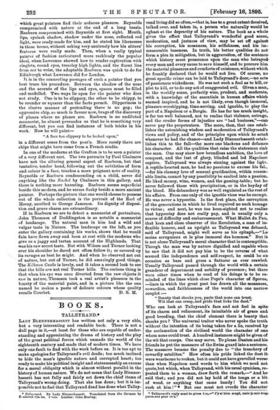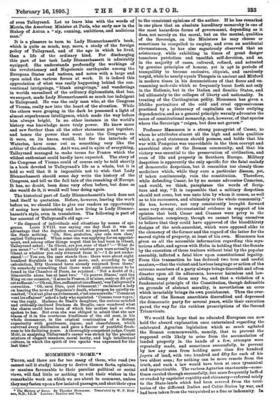BOOKS.
TALLEYRAND.* LADY BLENNERHASSETT has written not only a very able, but a very interesting and readable book. There is not a dull page in it,—at least for those who are capable of under- standing and appreciating the drama of history and the play of the great political forces which unmade the world of the eighteenth century and made that of modern times. We have only one fault to find with the work before us. It is too apt to make apologies for Talleyrand's evil deeds ; too much inclined to hide the man's ignoble nature and corrupted heart; too ready to make his political insight and statesmanship an excuse for a moral obliquity which is almost without parallel in the history of human nature. We do not mean that Lady Blenner- hassett has not fully and fairly set down the chief items of Talleyrand's wrong-doing. That she has done ; but it is im- possible not to feel that Talleyrand dead has done what Talley-
• Tallnraud. By Lady Elennerhassett. TranaLsted from the German by F.ederiek Cla. ke. 2 vols. London: John Murray.
rand living did so often,—that is, has to a great extent deceived, talked over, and taken in, a person who naturally would be aghast at the depravity of his nature. The book as a whole gives the effect that Talleyrand's wonderful good sense,. moderation, and justness of view, may be set off against
his corruption, his meanness, his selfishness, and his im- measurable baseness. In truth, his better qualities do not form a plea in mitigation, but in aggravation, of the sentence. which history must pronounce upon the man who betrayed; every man and every cause to save himself, and to procure him the material pleasures and comforts of existence, without which he frankly declared that he would not live. Of course, no great specific crime can be laid to Talleyrand's door,—no acts of passionate wickedness. He was not such a fool as to kill, or plot to kill, or to do any act of exaggerated evil. Given a man,. in the worldly sense, perfectly wise, prudent, and moderate, with a knowledge of the essentials in human affairs which seemed inspired, and he is not likely, even though immoral, pleasure-worshipping, time-serving, and ignoble, to play the part of a Napoleon or a Borgia. He has far too much insight,. is far too well balanced, not to realise that violence, outrage, and the cruder forms of injustice are "bad business,"—can never pay the perpetrators. The more, then, that one estab- lishes the astonishing wisdom and moderation of Talleyrand's views and policy, and of the principles upon which he acted. whenever he had the chance—and Lady Blennerhassett estab- lishes this to the full—the more one blackens and defames. his character. All the qualities that raise the statesman sink the man. One may show how boundless ambition, the love of conquest, and the last of glory, blinded and led Napoleon. captive. Talleyrand was always sinning, against the
A reptile-hearted man, he had no passions to excuse his fal, —for his clammy love of sensual gratification, within reason- able limits, cannot by any possibility be exalted into a passion, He liked money, wine, women, and the gaming-table ; but he. never followed these with precipitation, or in the heyday of the blood. His debauchery was as well regulated as the rest of his affairs. From one only of the ignoble vices was he exempt. He was never a hypocrite. In the first place, the corruption of the generations in which he lived required no such homage to virtue ; and next, he was too keen-sighted not to realise- that hypocrisy does not really pay, and is usually only a. source of difficulty and embarrassment. What Mallet du Pau, that keen and close observer of the Revolution, a man of in- flexible honour, and as upright as Talleyrand was debased, said of Talleyrand, might well serve as his epitaph,—" Le- moins scrupuleux et le plus immoral des hommes." But it is not alone Talleyrand's moral character that is contemptible. Though the man was by nature dignified and capable when he saw that it did not pay him to be the reverse of what seemed like independence and self-respect, he could be oa. occasion as base and gross a flatterer as ever crawled. Usually Talleyrand passed through the world with a certain grandeur of deportment and nobility of presence ; but there were other times when to read of his doings is to be re- minded of the lines which close Pope's character of Sporus, —lines in which the great poet has drawn all the meanness, cowardice, and faithlessness of the world into one narrow couplet :— "Beauty that shocks you, parts that none can trust.
Wit that can creep, and pride that licks the dust."
Who can look at Talleyrand's face and not feel in spite of its charm and refinement, its inimitable air of grace and, good breeding, that the chief element there is beauty that shocks you ? The universal traitor who never spoke the truth without the intention of its being taken for a lie, received by the acclamation of the civilised world the character of one whom none could trust. A hundred instances might be given of the wit that creeps. One may serve. To please Denton and his friends he put the massacre of the Swiss guard into a sentence. The massacre became the penalty due to "the treachery of cowardly satellites." How often his pride licked the dust it were wearisome to reckon, but it could not have grovelled worse- than when Napoleon used words to him which we need not quote, but which, when Talleyrand, with his usual cynicism, re- peated them to a woman, drew forth the remark,—" And he- said that ; and you did not lay hold of the tongs or a bit. of wood, or anything that came handy ! You did not. rush at him ! "* Bat one must not overdo the character-
• Talleyrand's reply must be given tm.—" J'yai bien sone, male jet subs trop, raresteux pour ee'a."
of even Talleyrand. Let us leave him with the words of Morris, the American Minister at Paris, who early saw in the Bishop of Anhui a "sly, cunning, ambitious, and malicious man."
It is a pleasure to turn to Lady Blennerhassetes book, which is quite as much, nay, more, a study of the foreign policy of Talleyrand, and of the age in which he lived, than a life of the ordinary kind. For discharging this part of her task Lady Blennerhassett is admirably equipped. She understands profoundly the workings of the revolutionary and Napoleonic earthquake among the European States and nations, and notes with a large and open mind the various forces at work. It is indeed this appreciation of what was really happening behind the con- ventional intrignings, "blank misgivings," and wanderings in worlds unrealised of the ordinary diplomatists, that has, we suspect, made Lady Blennerhassett so much too indulgent to Talleyrand. He was the only man who, at the Congress of Vienna, really saw into the heart of the situation. While the others were groping in the dark he possessed a light of
almost superhuman intelligence, which made the way before him always bright, In no other instance in the world's history was knowledge more truly power. He knew more and saw further than all the other statesmen put together, and hence the power that went into the Congress, as it were, on its knees, would, but for the interlude of Waterloo, have come out as something very like the arbiter of the situation. As it was, and in spite of everything, Talleyrand managed to make terms for France which the wildest enthusiast could hardly have expected. The story of the Congress of Vienna could of course only be told shortly in a book devoted to Talleyrand's life as a whole, but it is told so well that it is impossible not to wish that Lady Blennerhassett should some day write the history of the Congress, and tell us the full tale of the remaking of Europe. It has, no doubt, been done very often before, but done as
she would do it, it would well bear doing again.
The historical part of Lady Blennerhassett's book does not lend itself to quotation. Before, however, leaving the work before us, we should like to give our readers an opportunity of seeing how interesting and how living is Lady Blenner- hassetes style, even in translation. The following is part of her account of Talleyrand's old age :—
" He disposed of individuals and situations by means of epi- grams. Louis XVIII. was saying one day that it was an advantage that the deputies received no payment, and so cost the State nothing. Oh, Sire, gratuites, que cela sera cher,' replied Talleyrand. When some one was applying for an appoint- ment, and among other things urged that he had been in Ghent, Talleyrand asked : 'In Ghent, are you sure of that ? '— What do you mean?'—' Well, tell me plainly whether you were actually in Ghent or whether you only returned from I do not under- stand.'—' You see, the case stands thus : there were about eight hundred Royalists in Ghent, not more, and, according to my calculation, fifty thousand have already returned from there.' On somebody remarking that there were still consciences to be found in the Chamber of Peers, he rejoined : Not a doubt of it ; Semonville alone has at least two.' 'Ce pauvre Blacas,' said the Bing on one occasion,' II aime la Prance, II m'aime, mais on dit qu'il est suffisant.'—' Oh oui, Sire, suffisant et insuffisant,' was Talleyrand's correction. 'Oh, mon Dieu, quel evenement ! ' exclaimed a lady on hearing the news of Napoleon's death, whereupon he quietly re- marked, Ce n'est plus an evenement, c'est une nouvelle." Comment vent lea affaires? ' asked a lady who squinted. Comme vous voyez,' was the reply. Madame de Steel's daughter, the serious-minded and critically-inclined Duchess de Broglie, once wondered what the charm could have been of which her mother had so often spoken to her. But even she was obliged to admit that she saw traces of it in the courteous kindliness of the old man, in his whole demeanour, in the original combination of a distant superiority with gentleness, repose, and cheerfulness, which survived every disillusion and gave a flavour of youthful fresh- ness to his declining years. A thoroughly competent judge, Count Mole, in analysing Talleyrand's career was struck by the peculiar mixture of elegant manners, moral laxity, and high intellectual culture, in which the spirit of two epochs was expressed for the last time."



































 Previous page
Previous page